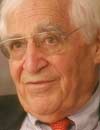- Steven Aftergood
Director, FAS Project on Government Secrecy - Mark Corallo
Former director of public affairs, Justice Department - James Goodale
First Amendment attorney - Walter Pincus
Reporter, The Washington Post - William Safire
Columnist, The New York Times - David Szady
Former assistant director of counter-intelligence, FBI
[Have classification levels changed?]
There's no doubt that classification activity has accelerated in the course of the Bush administration. Why is that? There are several reasons, some of them good, some of them less good.
For one thing, we are in a heightened security environment post-9/11, and we have large military operations actively under way right now. Whenever that's the case, there's going to be increased secrecy. I think no one doubts the need for increased classification in time of war, but that's not the whole explanation.
There is also an increased willingness to exercise classification authority for silly reasons or no good reason at all. A few years ago I sued the Central Intelligence Agency under the Freedom of Information Act seeking declassification of the intelligence budget total, one number. This was in 1997. And they disclosed the number. It was $26.6 billion at the time for the entire intelligence community.
A few years later I asked them: "What was the total intelligence budget for 50 years earlier? What was the budget for 1947 and 1957 and 1967?" And they said, "Oh, no, we can't tell you that; that's classified." So you have a bizarre situation in which the budget total, the intelligence budget for 1997 is declassified. It didn't leak; it was officially declassified. But the budget for 10 and 20 and 30 and 50 years earlier is still classified. Why? Because the CIA says so. It makes no sense at all, but it is the policy of our government. ...
[What are the classification designations?]
Most of the time when we talk about secrecy, we're talking about classified information, which is information that is officially marked according to presidential direction as either "Confidential" or "Secret" or "Top Secret." But above and beyond the classification system, there are a whole series of controls, restrictions on unclassified information.
There are markings such as "For Official Use Only" or "Sensitive But Unclassified" or "Limited Official Use." There are literally dozens of such things which are used to restrict the distribution of unclassified information, and this is something that has really spiraled out of control in recent years.
According to one estimate, there are more than 60 different restrictions on unclassified information that have been used. It's not simply that it impedes access by the press to information, but it also ties the government up in knots, because if one agency has information that it says is "For Official Use Only," but another agency has information that it says is for "Limited Official Use," can they exchange information and expect that their information will receive the same level of security that it does in their own [agency]?
It's a nightmare. Agencies are tying themselves up in knots with these sort of ad hoc restrictions that have been invented. It's a very serious problem, because most classified information, there's at least a shadow of a reason why it's classified. But in many cases, something that is marked "For Official Use Only," that's essentially a made-up kind of restriction, and what it does is to block or at least to slow down the dissemination of information inside and outside of the government.
… I'm trying to report a story; I come across a document like that. What happens?
When one of these designations is used to control unclassified information, its impact is a little bit unpredictable. Some officials will say, "Oh, if it's not classified, I don't care; I'll give it to you." That's great from a reporter's point of view.
But others will say: "It's 'For Official Use Only.' It has this designation on it. I can't give it to you, even though it's unclassified." That turns out to be quite a problem, because it amounts to a kind of de facto classification for unclassified information, and the upshot is that a lot of information that might otherwise be disclosed gets held up.
Now, simply marking a document "For Official Use Only" does not by itself change your legal rights under the Freedom of Information Act. You could still file [a request] for information that bears such a marking. But the point is that you actually have to request it formally. You have to go through the motions. Simply asking for the information is no longer enough. And that can mean the difference between getting a story and giving up, because it will takes weeks or months to get the record. It's a big problem.
Who's making these designations? Are they trained and qualified to be designating?
In most cases, any employee of the government can stamp something "For Official Use Only." At least in the classification system, the formal classification system, you are supposed to have official presidential delegation of authority in order to create new units of classified information. But anyone can write "For Official Use Only" on a document and effectively keep it out of the public domain on a timely basis. ...
How many documents are we talking about now being subject to these designations?
This problem of controls on unclassified information is a much bigger problem than the problem of classification itself, which itself is a very big problem. But the volume of information, unclassified information that is somehow restricted, is vastly bigger than the world of classified information, and no one really has an idea of just how big it might be.
I can tell you that there are many, many more government employees who are authorized to create, to impose these designations on unclassified information than there are who can classify records. And they do. It's much easier to do. There are no restrictions; there's no oversight. It's a way of restricting the flow of information that is much more consequential, I think, than the classification system.
... Are we talking about millions of documents? Are we talking about billions of documents? What's the paper load here?
It's impossible to say. And keep in mind that increasingly, documents are not paper records, but are soft-copy electronic records, and entire databases and software systems will be designated as off-limits. So it can easily be many millions of records.
Again, there are legitimate reasons why unclassified information might not be and should not be publicly available. People's Social Security numbers are not classified, but they are sensitive, and they should be withheld. There's all kinds of privacy information.
There may be proprietary information. There may be security information. The workings of an alarm system at a government installation may not be classified, but it's understandable that they would be withheld. The problem is not the existence of such controls, but the way that they have proliferated and mushroomed, and the way that they are being imposed indiscriminately. ...
[Tell me about the Information Security Oversight Office's study.]
The Information Security Oversight Office is an organization within the federal government that is responsible for overseeing classification and declassification activity throughout the government. Among their responsibilities, they produce a report annually which tabulates agency statistics on how much they have classified, how much they have declassified. They provide one of the few objective, statistical measures of changes in classification policy.
Among other things, they have shown record growth in classification activity in this administration. The volume of new classified material has literally reached a record high in the Bush administration. Meanwhile, declassification activity, which was at record-high levels in the 1990s, has tapered off considerably. Records still do get declassified, but much more slowly than in the recent past.
I believe they also found that there was a lot of improper classification and designation happening, that things were not being properly marked. ...
The Information Security Oversight Office ... did a study of records at the National Archives that had been withdrawn from the public stacks, reclassified. What they found was that at least a third of those records should not have been withdrawn. They were properly public information, and yet agencies considered them classified and removed them from public access.
If you take this study and look at it as a benchmark of the system as a whole, it suggests that at least one-third and probably more of all of the records that agencies classify should not be classified, that there's no valid reason for them to be withheld from the public. That's an astonishing and alarming statistic, because it suggests that just a huge fraction of official secrecy is not justified on national security grounds.
How would this ever get rectified? What would have to happen?
How will this ever get rectified? It won't get rectified without a will to correct it on the part of agency heads themselves. It's not enough for reporters or even for members of the public to say, "This is unacceptable."
It will change when the senior leadership at the agency levels says, "We are not going to classify information that doesn't need to be classified." When they make that commitment and instruct their agencies to follow through, then it will happen. It won't happen until then.
When will they make such a statement? They will make such a statement when the top of the administration, the president and the senior leadership, say, "Classification is only to be used for legitimate national security reasons and not for any other reason." Until that signal comes from the top of the administration, we're not going to see a change.
... I'm looking at a quote from a memo on Oct. 12, 2001, and the attorney general is saying, "When you carefully consider FOIA [Freedom of Information Act] requests ... and decide to withhold records in whole or part, you can [be] assured" -- he's talking to people in the government of the United States -- "that the Department of Justice will defend your decisions"; that is, not to release information. Really just the opposite of the policy or the memo that went out under Clinton and [Attorney General Janet] Reno in the previous administration.
That's true. And the reason that Attorney General Ashcroft had that memo drafted and implemented was because he got complaints from the professionals that dealt with the Freedom of Information Act. They had serious concerns about Privacy Act suits. They had serious concerns about ongoing case matter being divulged. ... That memo is the fix.
In practice, because I have to deal with this from day one of my tenure at the Justice Department, I always checked with the career professionals in the FOIA office to find out, how's it working? Has it limited information flow? What's the change? The practical effect was there was no change.
... I hate to make this broad a statement, but ... the journalism community as a whole, even parts of the academic community, believe that this administration has been the least forthcoming in terms of freedom of information. ... And we just saw this whole thing where ... there were documents that they want to now reclassify that are in [the] National Archives. That's never happened before.
No, I agree. ... First and foremost, we have to remember that we are at war, and we have never had a war like this. Every day is a new day in this war on terror. This is not anything any American president has ever had to deal with. No administration has ever been faced with an enemy that wants to kill us the way these guys do. ...
But you know that all government bureaucracies don't like to reveal what they're doing to the public. It doesn't help them.
But in this case, that's their job. The FOIA office is not there just to put information out. It's there to make sure that -- particularly at the Justice Department -- that the integrity of investigations is maintained, that Privacy Act concerns are protected. ... They wanted to be able to take more time, have a more critical eye, when they looked at these things. ...
Well, who are [the FBI] to classify The New York Times as top secret? ... The problem is the classification system. Every damn thing in Washington is classified, including The New York Times as in the Pentagon Papers case. We cannot take the classified system and the classification on a document as a given, and the only way we have any control over classification is to have leaks. ...
The director of the CIA [Porter Goss] publicly said, "I want to see reporters in the well of a court," because he wants to know how leaks took place and who leaked classified secret information that he says damaged the national security of the United States.
Oh. (Laughs.) You break my heart with those words, because I believe that he wants to do it, but I don't think his point makes any sense at all. Let's just start with reality. ... The vice president of the United States said he had the ability to declassify information all by himself, and it's OK if [former Chief of Staff to Dick Cheney] Lewis Libby leaked classified information in the Judy Miller case. I mean, they want to have it both ways. They can use classified information any way they want to help them. But when there's classified information that's leaked that embarrasses them, then we have to have reporters go to jail and they get punished. ...
Now, you've said that the Bush administration wants to have it both ways. To quote you: "Indict those who receive classified information until it decides to declassify it for its own political purposes." Give me an example.
That example would be The Washington [Post] prison story. ... At the time that story was published, Sen. [Bill] Frist [R-Tenn.] and Congressman [Dennis] Hastert [R-Ill.] said that this violated national security, it gave comfort to our enemies, and asked that it be investigated.
All right, now what happens X months later? President Bush gets up, uses the same classified information that The Washington Post did, and says, "Hey, it happened, and I want you to know that as a consequence of it happening, in effect, we have prisoners in Guantanamo we want to take and try under ... a military court system." He went to Congress, made that announcement, and he traded the release of that information for new legislation. ...
I would like to say one other thing, if I may, about the amount of classification of documents in the United States. The Bush administration has classified 15 million documents last year. ... Now, multiply 15 times eight. ... Well, it's 120 ... million classified documents. Now, are we going to sit here and say the press can't publish any of 120 million documents, and they all imperil our national security? It's not true. ...
... [How do documents become classified?]
It is a game. ... I worked for Sen. [J. William] Fulbright [D-Ark.]. We did two investigations in the '60s that were closed-door hearings, and we had to go through the process of clearing them, so I went through the process of declassification 40 years ago. There were no standards, and there still are none. …
There is no central place where you have the [standard for] what's classified and what isn't. That's one of the issues. It's one of the reasons people leak, because a lot of what they consider as classified, what's marked classified, isn't.
You mean when a document is stamped classified, there's no standard?
A document that's really stamped classified is stamped classified at the highest classification, and then a really well-done document is stamped paragraph by paragraph. If there's no classified information in it, there's a U. If there's secret information, there's an S.
You mean down in the margin?
Yeah, right on the left side. And when it's originally classified -- there are only in the Pentagon now something like 1,800 people who can originally classify a document -- but when they do it, at the end of it they've got to put their name, they've got to put a date when it was done, and they have to put an estimate about when it can be declassified. The GAO did a study on 110 documents from the Office of the Secretary of Defense. There were 66 million -- ... 13 million in one year, but there are only 2,000 people who originally can classify things.
Thirteen million documents are classified every year in the Department of Defense?
Right.
By a group of?
Well, there's original classifiers. Then there's derivative classifiers -- somebody who gets a classified document, they rewrite it, put it in another document, stamp it. And then [there are] a lot of people who don't have the authority who stamp it anyway.
Because?
There's something in it that they think is classified or embarrassing or whatever.
So there's no real standard for what's classified --
There are no organized standards; there are general rules. And there's no penalty for overclassifying.
So you're saying that's why people leak?
Sometimes that's why people leak, because they don't think it's really classified or their bosses have said something that's contrary to what's in the story.
Some people just leak information that's wrong, which is where the press [has] got to figure it out. Just because they say something's classified doesn't mean it is, and just because they say it's classified doesn't mean it's true.
So then how do you see all of this? The New York Times recently, by Congress and the president, has been accused of being traitorous, possibly a target for the Espionage Act, undermining the national security of the United States. Ridiculous? Real?
It depends on the information. To be honest, we all, as [New York Times executive editor] Bill Keller said, make our own judgments. You're not supposed to print something that's classified unless you talk to the government about it, let them make their case. Then we make a judgment.
Governments don't like that. The public doesn't understand it. But a lot of us have been doing it for years. In some ways, my experience, going back 40 years when I worked at the Senate Foreign Relations Committee, taught me a little bit about the classification process.
I served in the Army in counterintelligence. I dealt with intelligence when I was in the Army [at the] end of the Korean War, so I've done it for a long time, and I have very strong feelings. I can tell when something is classified and when it isn't, and I'm willing to argue with anybody about it.
Because viscerally you can tell?
I can tell based on my understanding, my experience and what the government says about it. We don't print things that are classified just because somebody told it to us. You should go by the government. We do go by the government, tell them what we've got, ask them to comment. That's when they get a chance to say, "Don't publish," "Publish," whatever.
No, because they liked me, and I was one of them. And also I have a feeling that there was too much classification going on.
You, William Safire, decided, sitting in the White House, decided on your own there was too much classification going on and I'm going to declassify documents? A speechwriter?
Let me tell you what happened once. I got a bunch of information from [Henry] Kissinger's office about Vietnam speeches I was writing. So I write the speech, and I put on the top of it: "I'm sending into Haldeman to give to the president. Secret. Eyes only. No dis," meaning no distribution.
Someone put that on there.
No, I did. I typed it across the top of the page. ... I sent it in, and I waited for the president to send the speech back, and it didn't come. I called Haldeman, and I said, "Where did [he put] the draft?" You know, the president would make notes on it, and I'll rewrite it. And he said, "I would send it back to you, but you're not cleared for top secret, no not for distribution." So I had classified my own stuff and I'm not cleared for it.
There's an element of ridiculousness in this overclassification business. I'm aware of the fact that stamping something secret is easy to do and unstamping it is very hard to do.
So you decided to leak some of it? I mean, you said earlier that you had been a source for some reporters in some cases involving classified information that you, William Safire, decided on your own to declassify.
No, I didn't declassify secret information; I spun. I said, "Now, this is what's been published, but this is what it means." Now, is that leaking? It's spinning. I didn't say, "This many troops went into this place." That would be leaking, but when you're inside, you should be expressing the point of view of the administration that's trying to affect public opinion.
Now remember, we're talking classified again, not information that goes to fraud and abuse or political situations or things of that sort. ... The information is clearly and properly classified. It can be declassified by those who classify it, and it could be given out at that particular time. But as an individual, you don't have the right to make those decisions and give away what is clearly classified information.
Even if he's perceived as being a whistleblower?
That complicates the issue if somebody is given whistleblower status. But even with that status, to give away properly classified information that jeopardizes sources and methods, that jeopardizes operations or things that the country is doing in the intelligence world or counterterrorism world or counterintelligence that will be damaging to the United States, you don't have the right to give that information away.
Even if you're describing something that's potentially illegal?
Fraud and abuse and illegal activity -- that's where it starts to get murky and complicated, exactly. Now remember, let's go back to the 11 questions. You have to clearly define in those 11 questions when you answer them. What the information was? Was the national security of the United States damaged? Was it properly classified? And so on and so forth, so that you're getting into the Department of Justice looking at the situation, what that information involves, what type of operations, what type of intelligence or sources it involves, and can make that type of determination. ...
![News War [site home page]](../art/p_title.gif)













